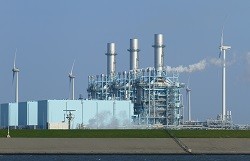Cleaner coal power through combined technologies
The EU-funded ECO-SCRUB project investigated – from a technical point of view – whether methods for retrofitting carbon capture technology to existing power plants could achieve environmental and economic efficiencies. Carbon capture and storage (CCS) involves capturing waste carbon dioxide (CO2) from power plants and transporting it to a storage site, where it will not enter the atmosphere. ‘For coal fired plants there are two key possible techniques; oxygen enrichment and post-combustion solvent scrubbing,’ explains ECO-SCRUB project coordinator Dorian Matts from RWE Npower in the UK. For example, CO2 can be removed from post-combustion flue gas using regenerable solvents; the most frequently used for CO2 capture is 'monoethanolamine' (MEA), an amine solvent. Power plants can also put in place new procedures to increase efficiency. These options for reducing CO2 emissions from coal fired plants present significant cost and technical issues. ‘The technologies available to greatly reduce or eliminate CO2 from flue gas are expensive, have a large footprint and have significant energy demands that also impact significantly on the market position for coal fired plants,’ explains Matts. Harmonious solution In order to address this, the ECO-SCRUB project sought to determine whether it was technically feasible to combine parts of both of these techniques in order to achieve efficient and more sustainable operations. The project team began by evaluating the impact of enhancing the oxygen content in the air feed and using existing generation carbon capture scrubbing on coal combustion. They also assessed flue gas recirculation, which can help with respect to reducing corrosion and SO2 emissions. ‘We were able to demonstrate that the concept is credible and has advantages for retrofitting on existing coal fired plants,’ says Matts. ‘We were able to determine what the likely design conditions would be – the amount of oxygen to inject and where; which current amine solution to select; and the amount of flue gas recirculation – to avoid higher NOx emissions or increased corrosion rates on the plant.’ The ECO-SCRUB project also addressed issues relevant to conventional capture, with results that could have wider applicability to new plant construction and ongoing carbon capture research. ‘If existing coal fired plants can survive long enough economically for the rest of the carbon capture and storage infrastructure to be put in place, then this appears to be an interesting and credible option for retrofitting,’ says Matts. ‘For example, European manufacturers may be able to develop this technology for retrofitting on newer existing coal fired power facilities globally. This in turn could help other countries, such as India and China meet their Paris Agreement commitments.’ Going forward The technology could help fossil fuel plants navigate increasingly treacherous waters. The EU’s Emissions Trading System (EU ETS) and other carbon pricing mechanisms have severely impacted on the relative competitiveness of coal-generated power. ‘The requirement to address acid rain pollutants (NOx and SOx) has also resulted in significant investment in flue gas cleaning technology in coal fired plants,’ adds Matts. Moving forward, achieving economic efficiency is therefore key to this sector, as is regulatory support. ‘Clear and stable environmental policies are now required to enable investment in CO2 capture, combined with the development and implementation of the transport and storage parts of the CCS approach,’ says Matts.
Keywords
ECO-SCRUB, Carbon capture, coal, power plants, emissions, ETS, CCS



